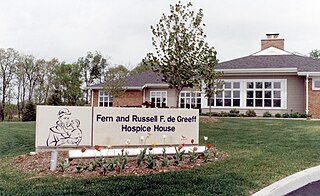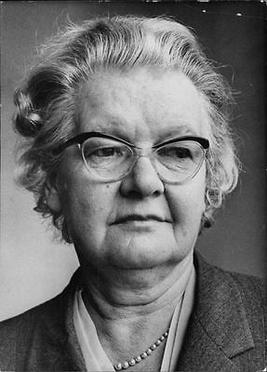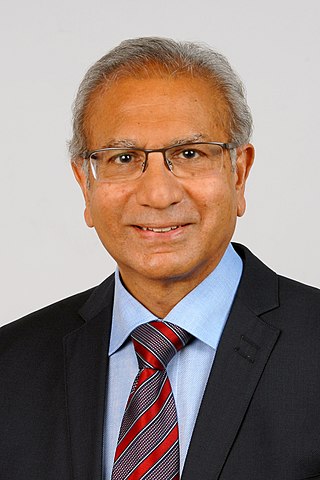Related Research Articles

Dame Cicely Mary Strode Saunders was an English nurse, social worker, physician and writer. She is noted for her work in terminal care research and her role in the birth of the hospice movement, emphasising the importance of palliative care in modern medicine, and opposing the legalisation of voluntary euthanasia.

Marie Curie is a registered charitable organisation in the United Kingdom which provides hospice care and support for anyone with an illness they are likely to die from, and those close to them, and campaigns for better support for dying people. It was established in 1948, the same year as the National Health Service (NHS).

The Florence Nightingale Faculty of Nursing, Midwifery & Palliative Care is an academic faculty within King's College London. The faculty is the world's first nursing school to be continuously connected to a fully serving hospital and medical school. Established on 9 July 1860 by Florence Nightingale, the founder of modern nursing, it was a model for many similar training schools through the UK, Commonwealth and other countries for the latter half of the 19th century. It is primarily concerned with the education of people to become nurses and midwives. It also carries out nursing research, continuing professional development and postgraduate programmes. The Faculty forms part of the Waterloo campus on the South Bank of the River Thames and is now one of the largest faculties in the university.

Ira Robert Byock is an American physician, author, and advocate for palliative care. He is founder and chief medical officer of the Providence St. Joseph Health Institute for Human Caring in Torrance, California, and holds appointments as active emeritus professor of medicine and professor of community health and family medicine at the Geisel School of Medicine at Dartmouth College. He was director of palliative medicine at Dartmouth–Hitchcock Medical Center, from 2003–14, and associate director for patient and family-centered care at the affiliated Norris-Cotton Cancer Center.

Ilora Gillian Finlay, Baroness Finlay of Llandaff, FRCP, FRCGP, FLSW, FMedSci is a Welsh doctor, professor of palliative medicine, and a Crossbench member of the House of Lords.
The Liverpool Care Pathway for the Dying Patient (LCP) was a care pathway in the United Kingdom covering palliative care options for patients in the final days or hours of life. It was developed to help doctors and nurses provide quality end-of-life care, to transfer quality end-of-life care from the hospice to hospital setting. The LCP is no longer in routine use after public concerns regarding its nature. Alternative methodologies for Advance care planning are now in place to ensure patients are able to have dignity in their final hours of life. Hospitals were also provided cash incentives to achieve targets for the number of patients placed on the LCP.

Hospice care is a type of health care that focuses on the palliation of a terminally ill patient's pain and symptoms and attending to their emotional and spiritual needs at the end of life. Hospice care prioritizes comfort and quality of life by reducing pain and suffering. Hospice care provides an alternative to therapies focused on life-prolonging measures that may be arduous, likely to cause more symptoms, or are not aligned with a person's goals.
Diane E. Meier, an American geriatrician and palliative care specialist. In 1999, Dr. Meier founded the Center to Advance Palliative Care, a national organization devoted to increasing access to quality health care in the United States for people living with serious illness. She continues to serve as CAPC's Director Emerita and Strategic Medical Advisor. Meier is also Vice-Chair for Public Policy, Professor of Geriatrics and Palliative Medicine and Catherine Gaisman Professor of Medical Ethics at the Icahn School of Medicine at Mount Sinai Hospital in New York City. Meier was founder and Director of the Hertzberg Palliative Care Institute at the Icahn School of Medicine in New York City from 1997 to 2011.
Robert Twycross was a retired British physician and writer. He was a pioneer of the hospice movement during the 1970s, when he helped palliative care gain recognition as an accepted field of modern medicine.

Children’s Hospices Across Scotland (CHAS) is a registered charity that provides the country's only hospice services for children and young people with life-shortening conditions, and services across children’s homes and hospitals. The first hospice was built thanks to the late editor-in chief of the Daily Record and Sunday Mail, Endell Laird, who launched a reader appeal which raised £4million. CHAS offers children’s hospice services, free of charge, to every child, young person and their families who needs and wants them.

Professor Sir Michael Adrian Richards, CBE, MD, DSc (Hon), FRCP is a British oncologist. From 1999 to 2013 he was the National Cancer Director in the UK Government's Department of Health. He was Chief Inspector of Hospitals in the Care Quality Commission from May 2013 until July 2017, and was said by the Health Service Journal to be the third most powerful person in the English NHS in December 2013.
Anne Merriman, MBE, MCommH, FRCPI, FRCP is a British doctor, known for her pioneering work and influential research into palliative care in developing countries in Africa. She has campaigned to make affordable oral morphine widely available.

Dame Albertine Louisa Winner was a British physician and medical administrator. After graduating from University College Hospital Medical School, Winner practised at the Elizabeth Garrett Anderson Hospital, the Mothers' Hospital in Clapton, and Maida Vale Hospital for Nervous Diseases.

Professor Emeritus Sam H Ahmedzai FRCP, FRCPGlas, FFPMRCoA is a British supportive and palliative care specialist and an Honorary Consultant Physician in Palliative Medicine.
Professor Geoffrey Warren Hanks DSc(Med), (1946-2013), also known as Geoff, was a British palliative care specialist.
Dame Barbara Monroe, is a British social worker and hospital chief executive.
Margaret Ruth Redpath AO is a retired Australian surgeon and radiation oncologist. She worked as a palliative care pioneer in Australia and the United Kingdom. She has also been a senior priest in the Anglican Church of Australia, particularly at St Paul's Cathedral, Melbourne. Redpath was awarded the Order of Australia medal and awarded a Doctor of Medical Science by the University of Melbourne.
Kimberly Sherell Johnson is an American clinical investigator. She is a Full professor of medicine at Duke University and director of Duke REACH Equity. In March 2020, Johnson's academic work was recognized with the first Richard Payne Outstanding Achievement in Diversity, Equity and Inclusion Award from the American Academy of Hospice and Palliative Medicine.
Jerzy Jarosz is a Polish anesthesiologist, and palliative medicine specialist. He also specializes in pain management, bioethics and medical cannabis.
Mari Lloyd-Williams is a Welsh medical consultant who specialises in palliative care. She taught at the University of Liverpool for more than two decades before moving to Liverpool John Moores University in 2022.
References
- ↑ "Ford, Dr Gillian Rachel, (Mrs N. I. Mackenzie)". WHO'S WHO 2024. Retrieved 21 October 2024.
- 1 2 3 4 5 Caroline Overy; Tilli Tansey, eds. (2013). Palliative Medicine in the UK c.1970-2010. Wellcome Witnesses to Contemporary Medicine. History of Modern Biomedicine Research Group. ISBN 978-0-902238-82-4. Wikidata Q29581795.
- ↑ "No. 48467". The London Gazette (Supplement). 31 December 1980. p. 3.
- ↑ Ford, G. (1 May 1992). "A palliative care system: the Marie Curie model". American Journal of Hospice and Palliative Medicine. 9 (3): 15–17. doi:10.1177/104990919200900305. PMID 1280959. S2CID 11797137.
- ↑ Purcell, Hugh (24 June 2013). "Norman MacKenzie obituary". The Guardian. Retrieved 8 May 2021.